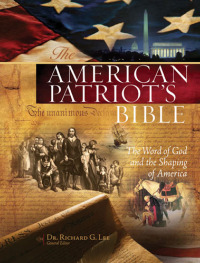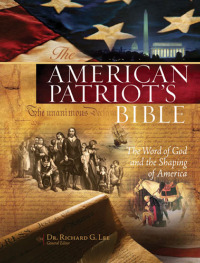Published by Thomas Nelson Publishers, The American Patriot’s Bible (henceforth Patriot’s Bible) consists of hundreds of commentaries on various patriotic themes, ranging in length from one sentence to four pages, inserted at various points throughout the New King James Version of the Bible. Every special interest Bible imposes a certain agenda that to some degree colors the Word, but the Patriot’s Bible takes this “coloring” to a whole new level. There’s not a single commentary in this Bible that even attempts to shed light on what the biblical text actually means. To the contrary, the text of the Bible is used merely as an excuse to further the patriotic agenda of the commentators.

There are a multitude of problematic aspects to the Patriot’s Bible, including the remarkable way it excludes from consideration almost every aspect of American history that could blemish the image of America or its heroes. For example, on the basis of Zechariah’s prophecy that the Messiah would “speak peace to the nations” (Zech. 9:10) we are given a full page eulogy of Christopher Columbus that celebrates how God had destined this “devout Catholic” to bring the good news of salvation to an unreached people group. Absent from the commentary is any discussion of how he and his fellow pioneers deceived, maimed, raped and murdered a large number of these unreached people.
Yet, the selective retelling of American history found in the Patriot’s Bible is not what concerns me the most. What disturbs me more is the way the commentators attempt to give their idealized version of American history divine authority by weaving it into the biblical narrative.
The central assumption that undergirds the Patriot’s Bible is that America is, in a unique sense, a nation established, governed, blessed and protected by God. Throughout the Patriot’s Bible, but especially in the Old Testament, an explicit parallel is drawn between Israel and America.
For example, George Washington is exalted as the “American Moses,” about whom the commentators wonder “[h]ow…is it possible for so much greatness to be embodied in one man?” Similarly, as God brought the Israelites out of oppression and led them into the promised land, so God led the brave pioneers of America out of their oppression and brought them to their promised land. As God fought on the side of the Israelites to ensure victory over their foes, so God’s providential hand was at work in all of America’s military victories. And just as God used the children of Abraham to bless the whole world, so God has used, and wants to continue to use, America to bless the entire world by bringing it freedom.
A question never addressed in the Patriot’s Bible is why anyone, American or otherwise, should agree with any of this. The Patriot’s Bible never tires of offering the reader quotes from various famous people in American history who believed all of this, but this simply begs the question. Why should we today regard the claims to divine favor found throughout our history as any different than similar claims made by political leaders of countries and tribes throughout history? After all, with very few exceptions, all countries and tribes throughout history have believed they were established, governed, blessed and protected by some god or another. When we read about early American pioneers who claimed it was “manifest destiny” that white Europeans would conquer and rule this continent, we have to ask ourselves why we shouldn’t regard such proclamations as simply a new version of a very old pagan mantra. (We’re also justified — indeed, required — to wonder what impact the contemporary Christian endorsement of this white European interpretation of providence might have on American Indians, African Americans and others who continue to suffer as a result of the violent European conquest of this land).
The assumption that God is uniquely invested and involved in America should especially concern Christians, since Jesus explicitly taught that the Kingdom he brought had nothing to do with nationalism or violence. His Kingdom was “not of this world,” and the proof he offered Pilate in support of this claim is that his followers would not engage in violence, as defenders of worldly kingdoms invariably do (Jn. 18:36).


The Kingdom that Jesus’ followers are to be committed to is one that expresses the “one new humanity” Jesus died to create, a humanity for which all dividing walls of nation and race have been abolished (Eph. 2:14). In Christ, we are no longer to relate to each other in terms of nationality, social class or gender (Gal. 3:28-29). The vision of the Kingdom we’re to be working toward is one in which people from every nation and tribe come together to worship around the throne (Rev. 7:9-10). And the Kingdom we’re to “seek first” is one that is centered on imitating Jesus’ loving sacrifice for his enemies (Eph. 5:1-2; cf. Jn 13:5; 1 Pet 2:20-21; Jn 2:6). In this light, it’s nothing short of tragic that we now find ourselves with a version of the Bible whose sole purpose is to reinforce the nationalism and celebrate the military victories of a particular country.
The point becomes even more important when we consider the long and sad history of “Christian” nationalism. Whenever the church failed to preserve the unique beauty of God’s trans-national Kingdom and allowed itself to be co-opted by the spirit of nationalism, bloodshed “in Jesus’ name” soon followed. Beginning in the late Middle Ages, this Christianized nationalism inspired Christians to wage war on other Christians in service to their respective countries. The numerous barbaric intra-Christian wars from the 14th to the 17th centuries significantly undermined the credibility of the Church and were the single greatest influence in the secularization of western culture.
Sadly, the Patriot’s Bible is saturated with this nationalistic, “fight-for-God-and -country,” mindset. For example, this Bible repeatedly celebrates God’s supposed providential hand in the American Revolution, which is simply one of the more recent examples of Christians slaughtering other Christians for nationalistic purposes.
To give but one illustration, on the basis of Paul’s encouragement for Christians to be “rooted and built up in Him and established in the faith” (Col. 2:7), the contributors to the Patriot’s Bible offer a review of John Quincy Adam’s claim that the Fourth of July is “the most joyous and most venerated” holiday after Christmas, claiming that the two are “indissolubly linked.” The Declaration of Independence, we are told, “first organized the social compact on the foundation of the Redeemer’s mission upon earth” and thereby “gave to the world the first irrevocable pledge of the fulfillment of the prophecies announced …at the birth of the Savior…” (p. 1352).
Now, one might legitimately wonder what possible connection exists between Paul’s admonition to be “rooted and built up in [Christ],” on the one hand, and this patriotic quote from John Quincy Adam, on the other. There is none, and this is sadly typical of the commentaries in the Patriot’s Bible. The biblical text has been reduced to nothing more than an artificial pretext to further a particular nationalistic and political agenda. One might also legitimately wonder how the Fourth of July beat out Easter for the second most joyous and venerated holiday. But the more important point concerns what this passage reveals about the vision of America advocated in the Patriot’s Bible. The Declaration of Independence, we are told, is nothing less than the pledge that Christ’s mission is being fulfilled, which is why American Christians should celebrate our victorious violence over our British brothers and sisters in Christ as the providential working out of Jesus’ mission!
This Jesus, remember, is the same one who commanded us to love our enemies, do good to those who hate us, bless those who curse us, pray for those who mistreat us and turn the other cheek so that we might become “children of the Most High, because he is kind to the ungrateful and wicked” (Lk 6:35, cf. 27-34; cf, Mt. 5:38-48). How the birth of this Jesus could be viewed as “indissolubly linked” to Christian-on-Christian violence is a wonder. But how this idolatrous connection could get inserted into a published Christian Bible leaves me speechless.
Part 2 of Greg Boyd’s review of the Patriot’s Bible will be posted soon. A response by the Patriot’s Bible‘s editor, Dr. Richard G. Lee, will also be featured on Out of Ur in the coming days.









